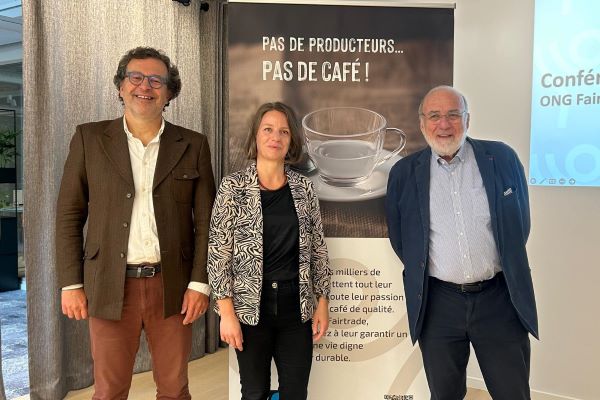 (L-R) Jean-Louis Zeien, President of Fairtrade Lëtzebuerg; Geneviève Krol, Director of Fairtrade Lëtzebuerg; Jean-Pierre Blanc, Director of Malongo;
Credit: Elza Osmane, Chronicle.lu
(L-R) Jean-Louis Zeien, President of Fairtrade Lëtzebuerg; Geneviève Krol, Director of Fairtrade Lëtzebuerg; Jean-Pierre Blanc, Director of Malongo;
Credit: Elza Osmane, Chronicle.lu
At a press conference titled “No Producers, No Coffee” held on Tuesday 30 September 2025, Fairtrade Lëtzebuerg President Jean-Louis Zeien, together with Jean-Pierre Blanc, Director of Malongo, brought attention to the volatility of global coffee prices, the challenges faced by small producers and the continuing relevance of the Fairtrade model.
The conference began by introducing Jean-Pierre Blanc, who has been the Director of Malongo since the early 1980s and is considered a key figure in bringing Fairtrade coffee to the French and European markets.
The discussion then turned to the gap between consumer perceptions of rising coffee prices and the realities faced by producers. Speakers referred to global coffee consumption and market pressures, including industry challenges, the role of Fairtrade despite rising prices and ways to ensure sustainable livelihoods for producers. Mr Zeien noted that coffee is a daily pleasure, with around 2.23 billion servings consumed worldwide each day, yet it hides complex realities.
Mr Blanc underlined that speculation has made the coffee market highly unstable. “Coffee is still the cheapest drink compared to soda or other products, but speculation on international stock exchanges has transformed the market into a vast casino,” he said. He added that sudden swings of €1 per kilo in a single day can occur without any link to production, driven instead by automated trading.
Mr Zeien explained the role of Fairtrade, noting that higher prices at the checkout do not necessarily mean greater income for producers. Fairtrade, he stressed, guarantees minimum prices, development and organic premiums, and ensures transparency in supply chains.
Fairtrade Lëtzebuerg reported that coffee sales in Luxembourg reached 457 tonnes in 2024, down 5% due to reduced foreign purchases, with 80% certified organic. Fairtrade coffee now accounts for 11.35% of the market, including four of the top ten brands sold locally.
Jean-Louis Zeien also pointed to broader structural challenges faced by coffee farmers, including climate change and extreme weather, plant diseases, low wages and difficult working conditions, rising production costs, discrimination against women and the heavy use of pesticides affecting health and the environment.
Jean-Pierre Blanc added that small producers and cooperatives are among the most vulnerable, noting that “often, cooperatives find themselves in deficit because producers sell to field buyers, the so-called ‘coyotes’, or fail to set prices in time”. He further explained that climate events in Brazil and Vietnam, which together produce more than 80 million bags of coffee, have major knock-on effects on supply and speculation, and that in such volatile markets intermediaries frequently step in, leaving cooperatives under pressure.
Mr Blanc also underlined that cooperatives take several years to become fully stable, often requiring four to five years of development before reaching their optimum. He referred to projects in Asia where former poppy plantations have been converted into coffee cooperatives, illustrating the long-term nature of such initiatives.
The discussion identified possible future challenges including the survival of cooperatives in a deregulated market, rural desertification as young people leave farming, the need for genuine corporate responsibility and the volatility of supply and demand leading to cycles of overproduction.
In conclusion, Mr Blanc emphasised that despite representing only a small share of global trade, Fairtrade remains a durable economic model, noting that “Fairtrade is not charity, it is an economic model which has lasted for over thirty years, and that is not an accident.”
EO








